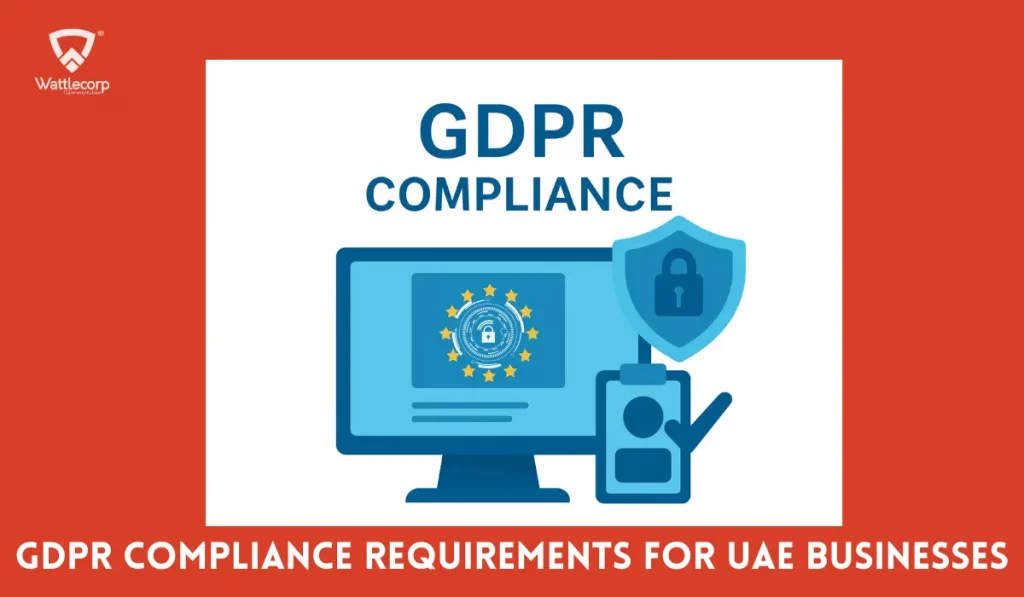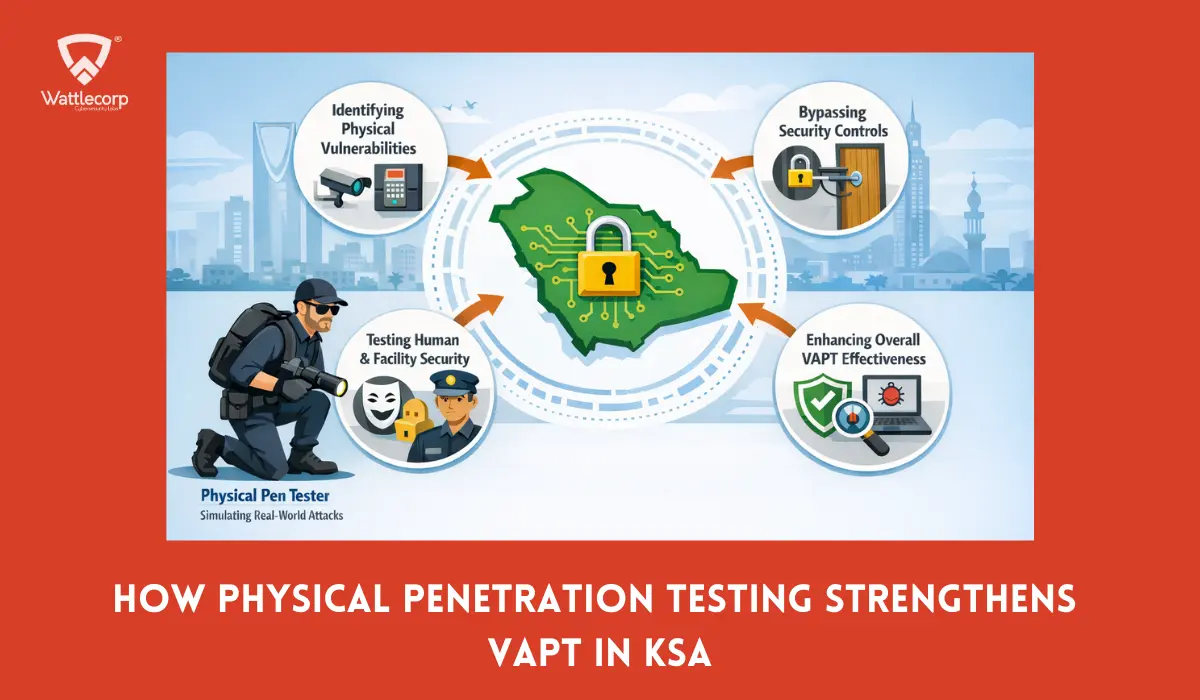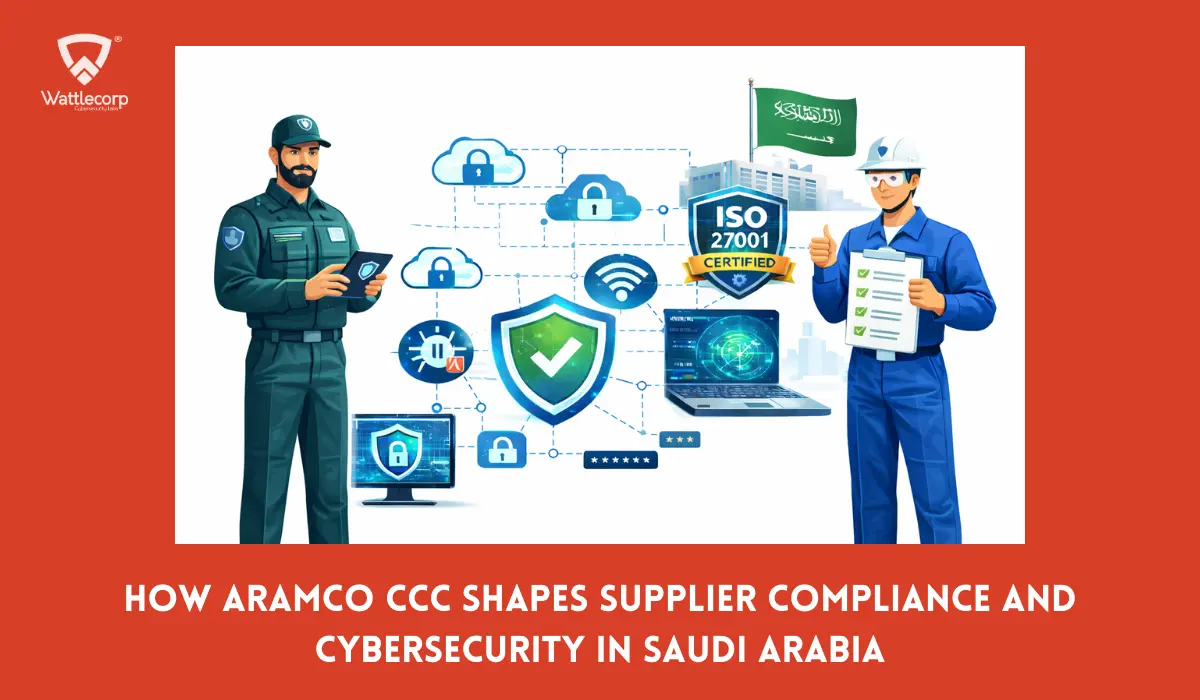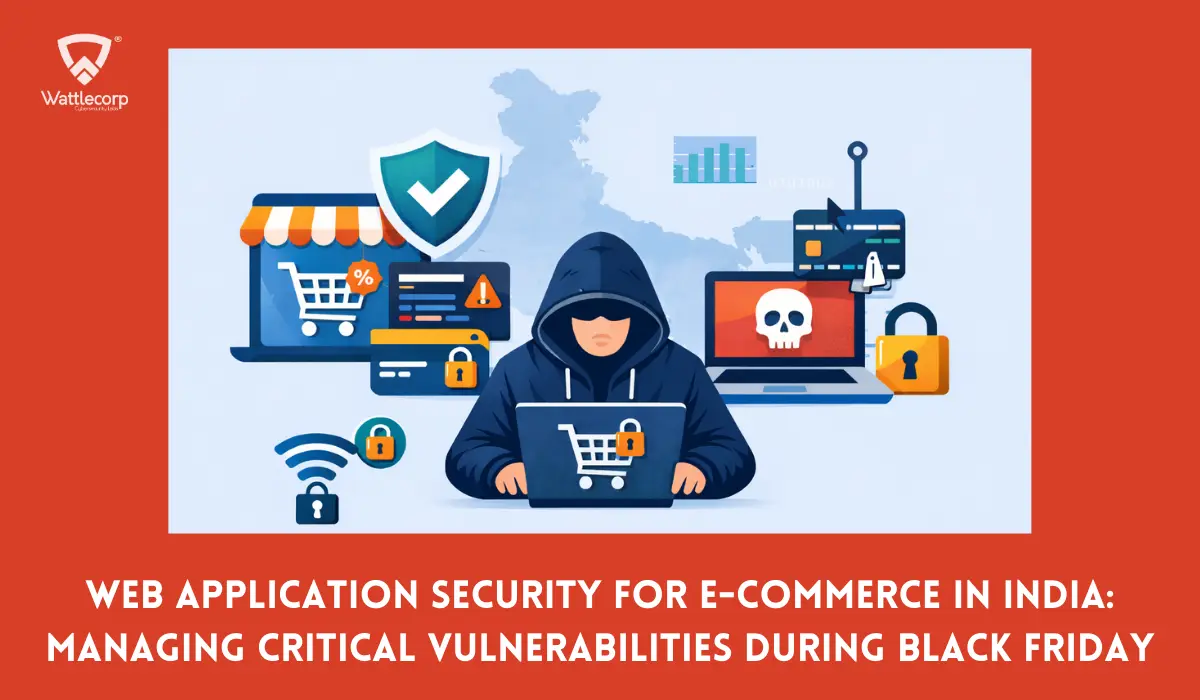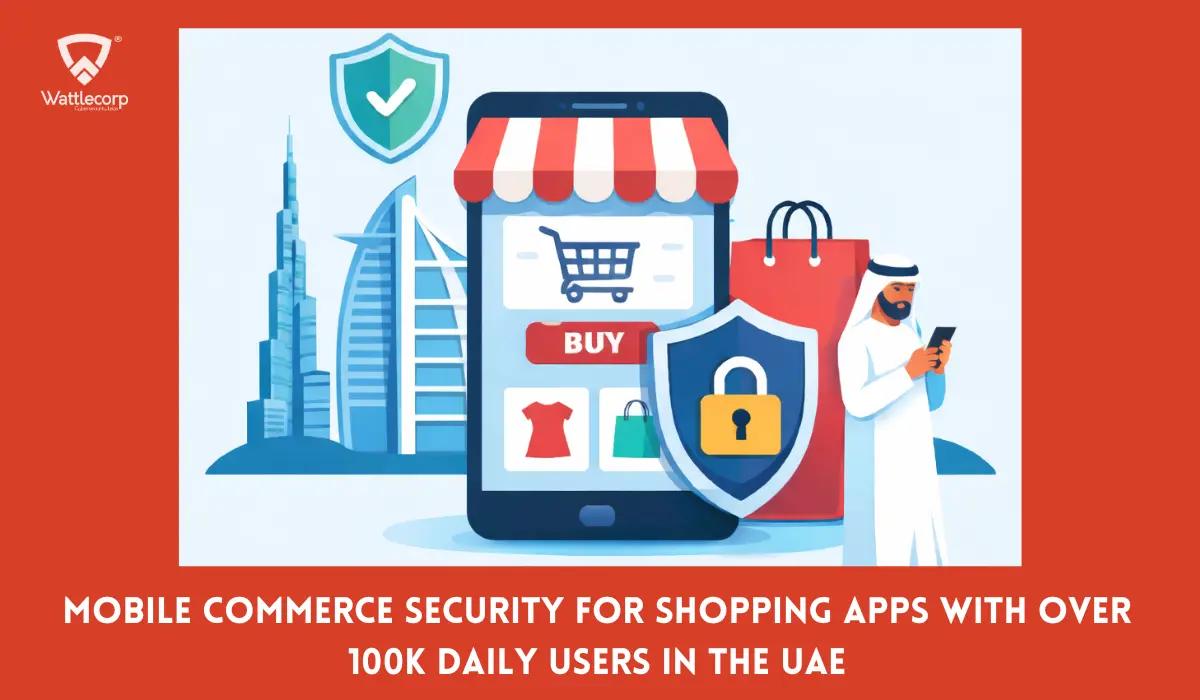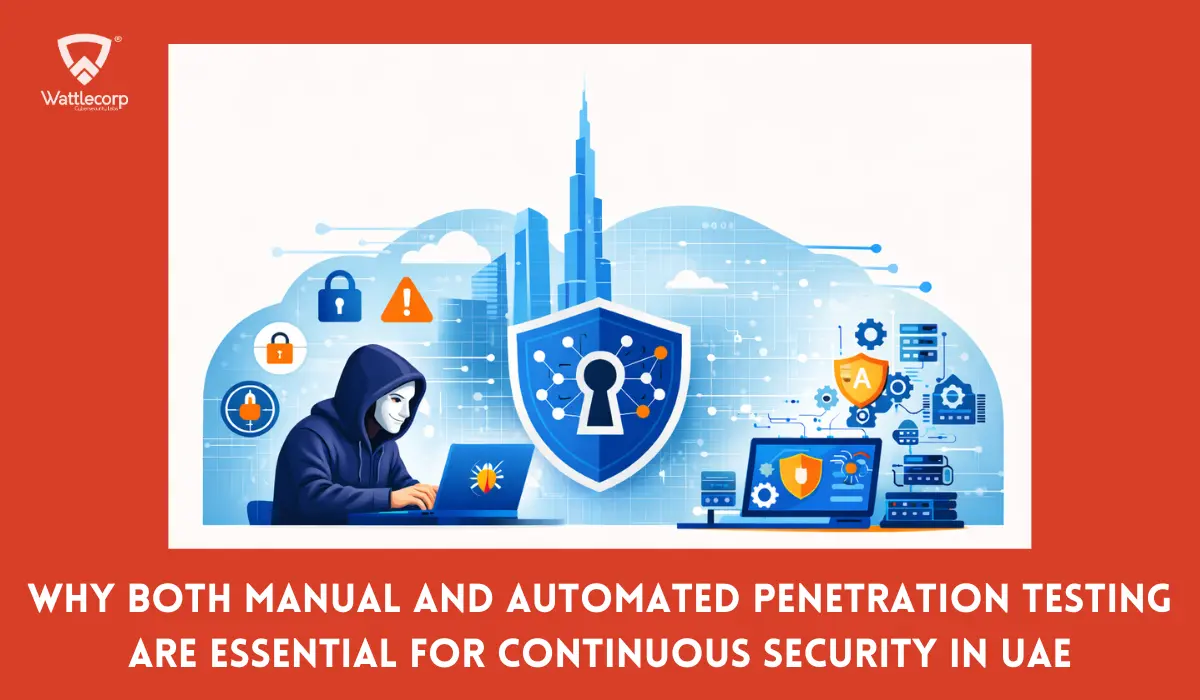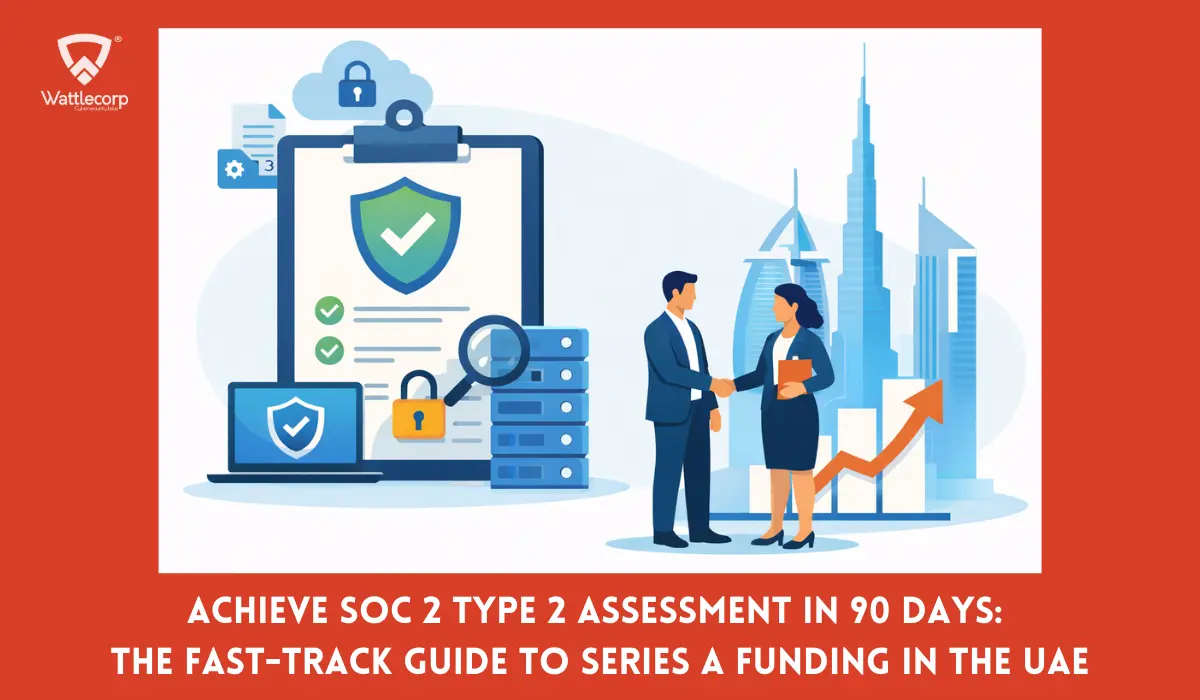Table of Contents
Toggle- What Are The GDPR Compliance Requirements For UAE Businesses?
- What Is GDPR Compliance & Why It Matters In The UAE?
- What Are The GDPR Compliance Requirements For Small Businesses In The UAE?
- Benefits Of Meeting GDPR Compliance Requirements In The UAE
- Who Should Follow GDPR Compliance In The UAE?
- Key GDPR Compliance Requirements for UAE Businesses
- Ensuring GDPR Compliance For UAE Businesses With The GDPR Compliance Requirements Checklist
- Common Challenges in GDPR Compliance: How Wattlecorp Helps Simplify GDPR Compliance?
- GDPR Compliance Requirements FAQs
What Are The GDPR Compliance Requirements For UAE Businesses?
If your business was fined €20 million, or 4% of your annual revenue, how would you react? For companies that do not comply with GDPR, this is not merely a hypothetical scenario; it is the actual one, especially when you’re operating in the UAE.
In today’s data-driven age, safeguarding personal data is now mandated by law.
If you are a business owner and you want to avoid compliance-related issues to retain customer trust, then understanding and adhering to GDPR compliance requirements is the only way.
Unfortunately, businesses can face significant difficulties since there is no ‘one-size-fits-all’ approach to meeting GDPR compliance requirements.
Situations become more complicated when the above scenario is mixed with the complexities of GDPR vendor compliance requirements and IT needs.
Naturally, these may seem frightening to you. They may also provoke you to take extreme measures for the sake of meeting GDPR compliance requirements. The blog intends to make it easy for you in an easy-to-understand stepwise manner.
It also explains why abiding with GDPR regulations is equal to ensuring cybersecurity standards if it means avoiding hefty penalties.
Here, you will learn the essential GDPR requirements you shouldn’t miss if your business’ security and that of your customers’ data matter to you.
Things to cover include:
- A practical GDPR compliance requirements checklist to get started
- Common Challenges in Meeting GDPR Compliance
- How companies of all sizes may get ready for GDPR compliance without going over budget
What Is GDPR Compliance & Why It Matters In The UAE?
• Understanding GDPR Compliance
GDPR (General Data Protection Regulation) refers to a European Union (EU) Law that serves to protect the privacy and security of personal data of its citizens.
GDPR Compliance mandates individuals, organisations, and the general public within the EU to meet the necessary legal requirements for effectively handling sensitive data.
Having come into effect on May 25, 2018, GDPR ranks as the world’s strongest privacy and security law.
• Why GDPR Compliance Matters For UAE Businesses?
The Personal Data Protection Law (PDPL) aka Federal Decree Law No. 45 of 2021 introduced by the UAE closely aligns with the EU GDPR standards. UAE businesses should strictly abide by GDPR compliance when:
- Processing EU residents or citizens personal data.
- Operating e-commerce platforms that particularly serve European customers.
- For the UAE’s digital commerce market having reached $19.46bn in 2024 and growing at 15.54% annually – making it inevitably necessary for the businesses to carefully handle EU customer data.
- Providing services to tourists from EU countries visiting the UAE.
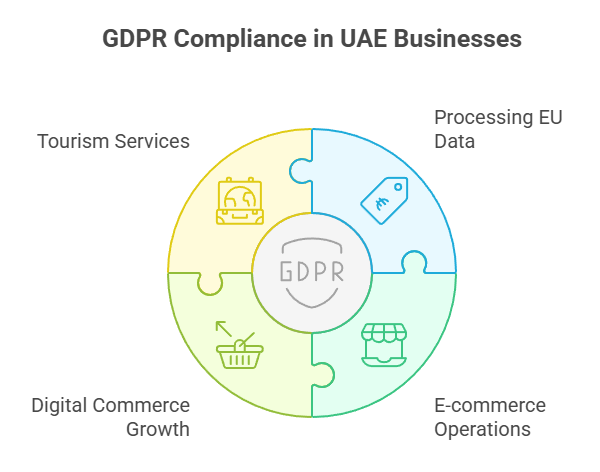
The ultimate goal of GDPR is to give the data subjects greater authority over their personal data by making it easier for them to access it wherever and whenever they can.
For businesses, GDPR means adequately safeguarding and managing critical data – both for their operations and maintaining confidential customer information.
What Are The GDPR Compliance Requirements For Small Businesses In The UAE?
When it comes to handling EU citizens’ data, or at the best, conducting business with European entities in the UAE, it’s the small businesses that face unique challenges. Being a globally recognized regulatory standard, businesses are mandatorily required to comply with the GDPR. Doing so helps avoid fines and penalties to a significant extent, provided that you are regularly checking on your compliance requirements in this regard.
Small businesses must ensure that consent is given freely as mandated by the Personal Data Protection Law in the UAE. Equal consideration should be placed when obtaining consent for every specific purpose of data processing.
Hence, no matter where you are located or how small or big your business is, you are liable to adhere to the GDPR policies to avoid harsh fines and penalties.
Benefits Of Meeting GDPR Compliance Requirements In The UAE
When businesses like you start complying with GDPR regulations in the UAE, you will be able to:
- Help Safeguard Reputation: By protecting critical data, businesses can retain and enhance their reputation. With the UAE witnessing 166,667 individuals falling victims to cyberattacks, leading to a combined loss of $746 million, this incident critically warranted a hefty fine from businesses – operating both in the region and for the EU.
- Enhanced data governance: By mandating robust data governance practices, such as inventory, clear data mapping, deletion, and retention policies, you can derive better overall data management.
- Builds and Maintains Customer/Client Trust: By committing to protect customer data, small businesses can win the trust and confidence of their customers/clients. It also helps build credibility. As per the Global Cybersecurity Index 2020, UAE sits in the top fifth position for employing a robust cybersecurity infrastructure.
- Avoids Potential Legal Penalties: Complying with GDPR Standards significantly helps prevent incidents related to data breaches. Businesses failing to adhere to GDPR face criticism, legal action, and a decline in clientele.
- Prevent Expensive Fines: The consequences of GDPR non-compliance can adversely impact a company, financial and reputational. Among the many factors that make UAE businesses pay hefty fines due to security breaches, anti-money laundering/combating the financing of terrorism (CFT) and similar unlawful activities loom large.
- Advantage Over Competitors: Smaller businesses complying with GDPR vendor requirements enjoy greater advantages than those who do not. Customers and partners like doing business with organizations that take data security seriously.
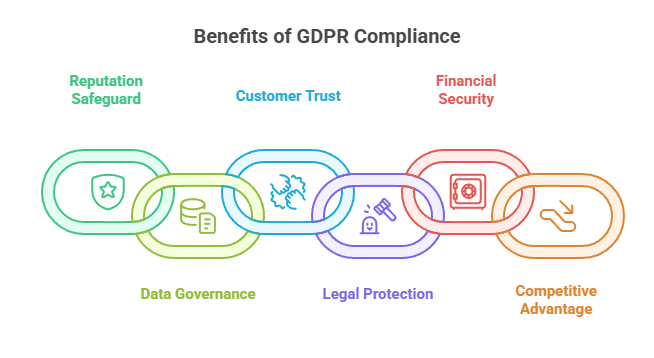
Who Should Follow GDPR Compliance In The UAE?
For organizations to follow GDPR compliance depends on specific legal frameworks that apply to both the UAE data regulations and GDPR.
UAE Data Protection Laws
- Three-Tier Legal Framework: This includes a set of data privacy laws – applicable to both the federal domain (Federal Decree Law No 45 of 2021) and the special economic zone, i.e., ADGM and DIFC. It is the federal domain applying to the mainland that is derived from the General Data Protection Law and implies strict adherence to GDPR compliance.
- Data Office Authority: The UAE Data Office has the right to exempt organizations that have nothing to do with personal data processing on a large scale.
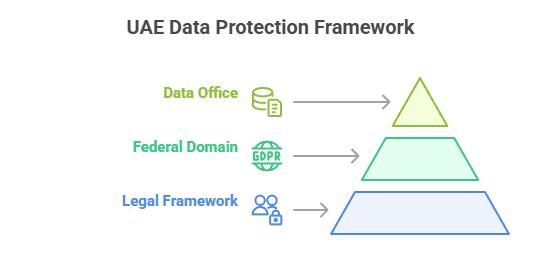
In short, you should follow GDPR compliance if you:
- Are actively conducting your business in any of the EU member states
- Your business processes EU citizens’ data even when operating outside the continent
- Are a SaaS platform owner managing data for EU companies as a vendor
Key GDPR Compliance Requirements for UAE Businesses
1. Lawful Processing of Data
Companies must process user information legally to comply with GDPR. This means that the collection and use of data must have a reasonable legal basis, such as user consent, contract fulfilment, or legitimate interests.
Suppose you run an online store, obtaining express consent to collect customer information for marketing purposes is a legitimate data processing method.
2. Data Subject Rights
People can exercise more control over their personal data through:
- Right to Access: Users can request to see the information they have saved
- Right to Rectify: Users can easily rectify inaccurate personal data, thanks to the regulations outlined in the GDPR
- Right to Erasure: In some situations, people have the right to request that their data be erased
- Right to Portability: Refers to the capacity to move data to a different service provider
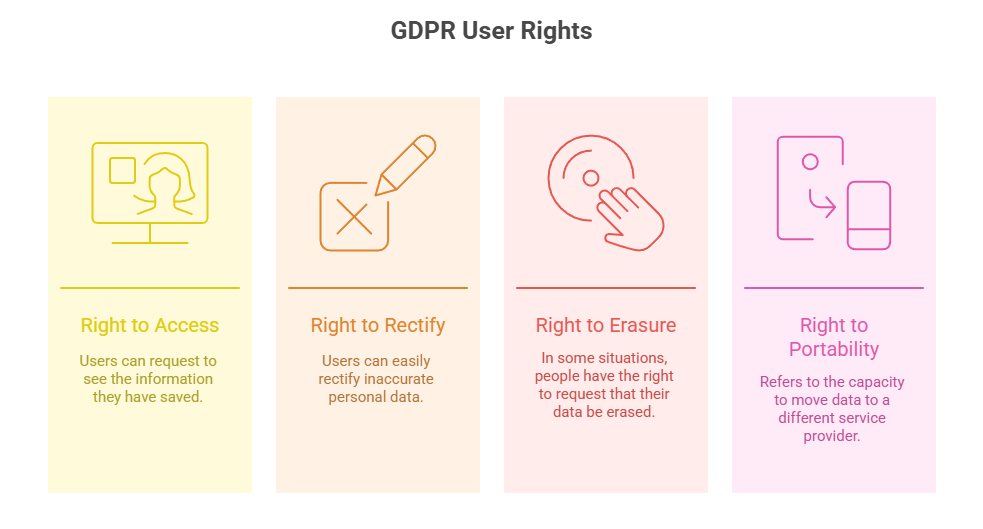
3. Documentation and Responsibility
Businesses bound by GDPR compliance should keep thorough records of all data processing operations.
– Things to Add:
- Information on the type of data collected
- The rationale for data processing
- Actions taken to ensure data security
4. Data Protection Impact Assessments (DPIA)
A Data Protection Impact Assessment (DPIA) is necessary in cases where high-risk data processing is required, such as intensive monitoring of extremely secret data.
Ways to Perform a DPIA:
- Naming and describing the processing operation
- Assess the importance and relevance of the activity
- Evaluate any possible hazards to human health
- Put procedures in place to lower hazards related to individual rights and freedom
5. Security Measures
To meet GDPR compliance standards, businesses must adopt robust technological security measures, such as:
- Encrypting sensitive data
- Regularly updating software and systems to fix issues
- Doing regular GDPR compliance assessments
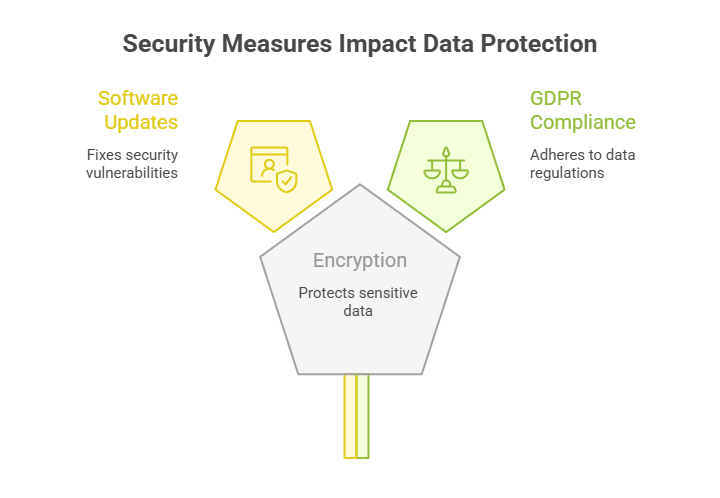
6. UAE-Specific Cross-Border Transfer Requirements
The Cross-Border Data Transfer Regulations implemented by the UAE Data Office requires adequacy decisions or safeguards for transfers outside the UAE.
Ensuring GDPR Compliance For UAE Businesses With The GDPR Compliance Requirements Checklist
GDPR compliance requirements have changed the way how businesses, industries, and individuals handle and ensure data privacy.
This actionable GDPR compliance requirements checklist will walk you through the essential steps to ensure your company is headed in the right direction.
The GDPR compliance requirements checklist below will highlight how small businesses can prepare for GDPR compliance.
1. Recognise the Significance of GDPR Compliance
When preparing a GDPR checklist, it is essential to first of all understand the GDPR fundamentals.
It’s about ensuring that your business handles personal data openly and safely.
It also covers lawful data processing, data subject rights, and technical safeguards to meet crucial GDPR requirements.
Bear in mind that noncompliance fetches the maximum penalty of €20 million. This is 4% of global annual revenue
Also Read : The Role of VAPT in Achieving Compliance in UAE
2. Assign a DPO (Data Protection Officer)
Even if it’s not legally considered mandatory, it is generally considered advisable to appoint a DPO. Regardless of the data volume you handle as an organisation, a DPO can probably strengthen your data management practices. More importantly, a DPO can effectively streamline compliance requirements and build customer trust in the process.
Make sure the enterprise risk management, GDPR compliance regulations, and documentation are securely managed by the DPO-as-a-service.
3. Perform GDPR Compliance Audit
Regular audits help identify non-compliance.
- Review methods currently employed for handling data
- Perform a GDPR compliance check using tools like Sprinto or Secureframe
4. Safe and Legal Consent to Process Data
For clear, informed permission, use forms.
- Make sure customers can easily withdraw their consent
- Establish systems to confirm consent compliance, particularly about GDPR IT compliance requirements
5. Consider Data Security Measures First
Sensitive information should be encrypted to avoid unwanted access
- Use firewalls and two-factor authentication to protect your systems
- Perform penetration testing to assess any weaknesses
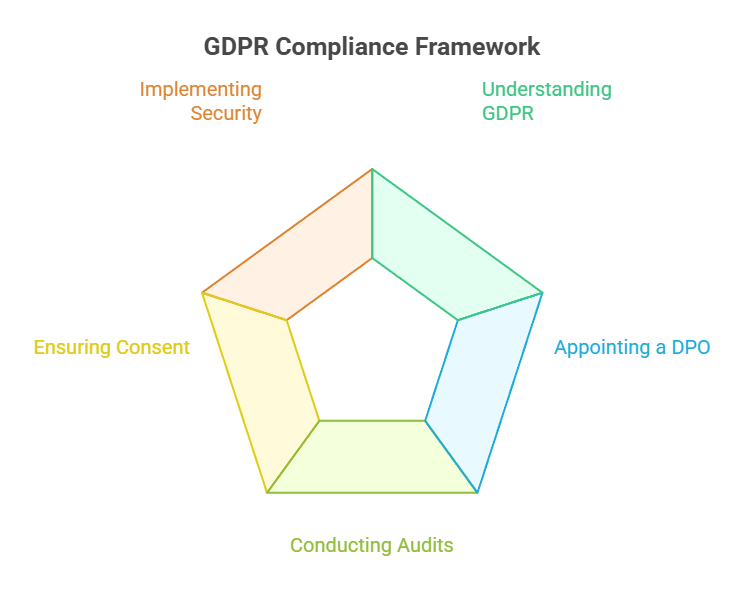
6. Maintain Track of All Data Processing Operations
For the GDPR compliance to operate efficiently, it should uphold transparency as its core principle. Likewise, organisations implementing GDPR need to be transparent enough when processing or storing sensitive data.
- Transparency can be ensured by keeping a data audit that will document the data’s location, source, and use
- To ensure that GDPR is followed, update this document often
7. Protect Data Subject Rights
Under GDPR, companies must safeguard the liberties of individuals, which include:
Access: Request to send a copy of your personal data
Rectification: Correct inaccurate data
Erasure (“Right to be Forgotten”): Delete personal data upon demand unless the law specifies otherwise
Portability: Allow users to transfer their data to another service provider by granting them portability
8. Perform Impact Assessments on Data Protection (DPIA)
For vulnerable data processing tasks, a DPIA is necessary.
- Identify possible risks and mitigate them by implementing effective strategies
- Engage GDPR compliance consultants if necessary
9. Train Your Staff to Adhere to GDPR
Being alert is key to preventing unintended breaches.
- Plan regular training sessions on GDPR policies and services
- Provide employees with the resources they need to handle data in an ethical manner
10. Get Ready for GDPR Vendor Compliance Requirements
If you rely on your third-party vendors, be sure they adhere to GDPR compliance rules.
- Utilise vendor agreements that include compliance requirements
- Assess vendor adherence to GDPR compliance specifications
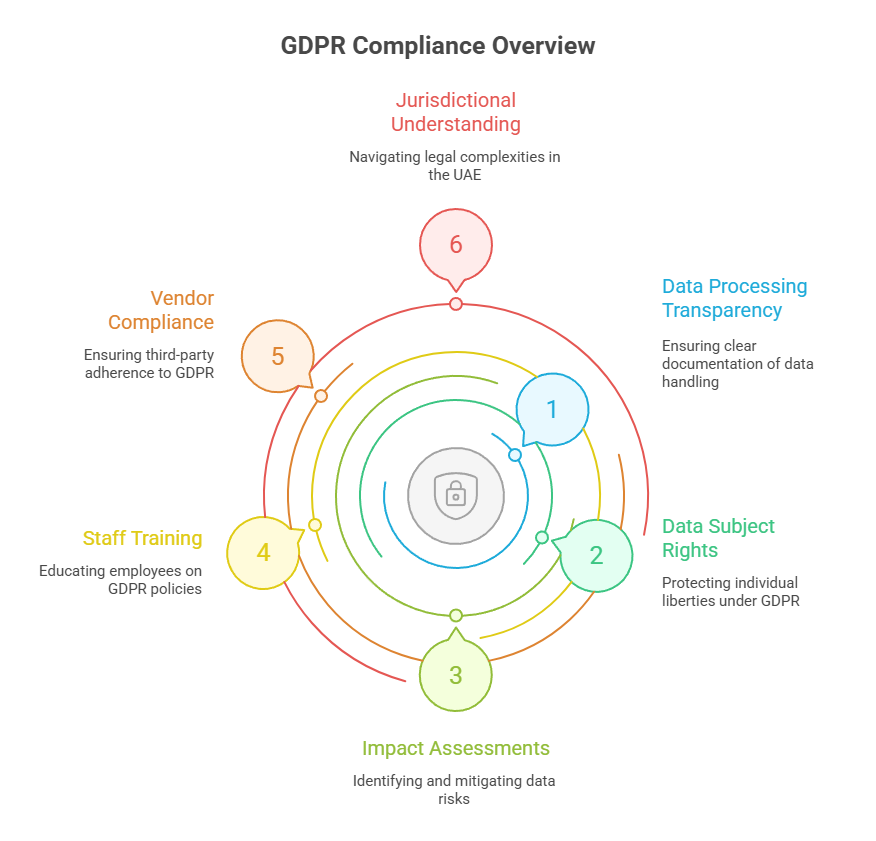
11. Understand Your Jurisdiction
Since the UAE has a dual-level judicial system, its jurisdiction can pose a complex issue when it comes to solving cross-border disputes.
- Check if your organization comes under Federal Decree Law No. 45 of 2021 (operate in mainland UAE)
- Determine whether your business abides by DIFC (DIFC Data Protection Law No 5 of 2020)
- Understand that banks and health-related personal data have different requirements
- If your business comes under ADGM data protection regulation
Common Challenges in GDPR Compliance: How Wattlecorp Helps Simplify GDPR Compliance?
Let’s look at the most common challenges in GDPR compliance that businesses face and how these can be resolved.
1. Identifying Data Sources
– How is your data stored, and where it is originating from?
Many companies find it challenging to identify their data sources.
This is mainly because they are dealing with complex GDPR compliance technical requirements and a wide range of client interactions.
– Why it’s difficult:
- Maintaining an accurate inventory is challenging since data is frequently dispersed across several systems.
- Third-party tools and platforms often make identifying and maintaining data more difficult.
– Wattlecorp’s Solution
- Map all of your data sources by conducting a GDPR compliance audit.
- To make sure nothing is missed, use technologies that integrate with your IT systems to create a comprehensive data inventory.
Also Read : Ensuring Data Privacy Compliance: Essential Steps For UAE Businesses
2. Confirming Vendor Compliance
– Can your providers meet the standards of the GDPR?
Choosing the right vendors or outsourcing partners is crucial to ensuring data security.
Their failure to comply can have an instant impact on your business.
– Why it’s challenging
Many companies want assistance in determining how their vendors are adhering to GDPR.
GDPR clauses are commonly left out of vendor agreements.
– Solution
Vendor contracts should mandatorily add clauses requiring GDPR vendor compliance.
Conduct routine audits of vendors to ensure they conform to security standards and fulfill EU GDPR compliance requirements.
3. Maintaining ROI and GDPR Compliance Costs
– Is GDPR compliance cost worthwhile?
Compliance expenditures can sometimes be too much for small firms to handle.
The expenses quickly add up, ranging from hiring consultants to updating systems.
– Why it’s challenging:
Hiring legal advice, purchasing GDPR compliance solutions, and putting security measures in place are all expenses associated with GDPR compliance.
For compliance projects, short-term ROI calculations could be very labour-intensive.
– Solution
Depending on the size of your business, select GDPR compliance consulting services that offer scalable choices.
Keep in mind that the cost of fines for GDPR violations might be much more than the initial outlay of dollars.
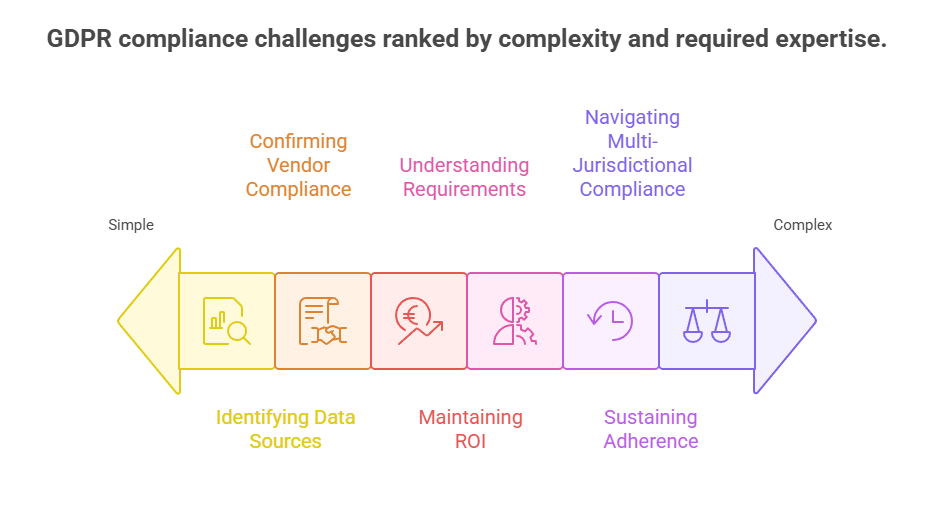
4. Understanding the Essential GDPR Requirements
-What adjustments are necessary to comply with GDPR?
Navigating the GDPR standards can be difficult, especially when putting technical requirements into practice and understanding legalese.
– Why it’s challenging:
Legal terms like “data minimisation” or “lawful processing” could be confusing to teams.
Aligning company procedures with GDPR compliance IT requirements requires experience.
– Solution
To comprehend the legal and technological requirements, speak with GDPR compliance professionals.
Train your IT and HR departments to make them aware of the criteria for meeting GDPR compliance.
5. Sustaining Adherence over Time
– Is your compliance strategy long-term?
Establishing compliance is one thing, but maintaining it in light of evolving laws and corporate procedures is another.
– Why it’s challenging
Ongoing monitoring and upgrades are required to meet the new GDPR security compliance requirements.
Businesses usually lack a dedicated workforce to oversee ongoing compliance measures.
– Solution
Arrange for routine GDPR compliance audits to identify vulnerabilities and take preventative action to address them.
Leverage GDPR compliance tools to monitor compliance and automate modifications in real-time.
Also Read : PCI DSS Compliance Cost in 2025: A Comprehensive Guide
6. Navigating Multi-Jurisdictional Compliance in The UAE
Attaining multi-jurisdictional compliance in the UAE requires a thorough understanding of the specific regulatory landscape that includes different emirates and free zones.
-Why it feels challenging:
The data protection landscape in the UAE is complex due to its dual legal system.
Solution:
- Perform jurisdiction mapping exercise
- Compliance frameworks to address all applicable jurisdiction
- Obtain UAE data protection specialist consultation
Costs and Fines for GDPR Non-Compliance
– How Much Will GDPR Compliance Cost?
Despite requiring a certain amount of upfront capital, GDPR compliance doesn’t have to be costly.
Companies may have to consider the following to comply with GDPR:
– Legal Actions
Creating/revising contracts and confidentiality agreements for meeting GDPR compliance.
– Technology Investing
To meet the technical necessities of GDPR compliance, use solutions like encrypted data, access control systems, and breach tools for detection.
– Training for Employees
Make sure that all of your employees are aware of the GDPR compliance requirements, especially those that deal with confidential information of EU citizens.
– Audit and Consultancy Fees
Completing a GDPR compliance audit or hiring GDPR compliance services for professional advice.
– Changes in Operations
Allocating funds to oversee vendor assessments, contractual revisions, and GDPR vendor compliance requirements.
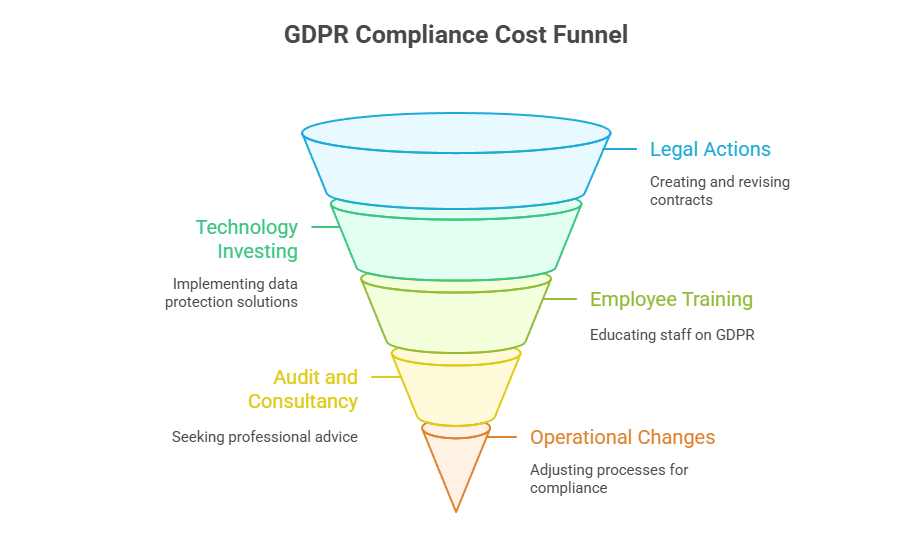
Here are a few well-known instances:
Google was fined €50 million for lacking transparency in disclosing its data collection methods.
A breach of privacy that disclosed consumer data resulted in a €20 million fine for British Airways.
1. Excellent Understanding of GDPR Compliance Services
Specialists in cybersecurity and law well-versed in EU GDPR compliance regulations make up for an expert Wattlecorp’s GDPR compliance consultancy team.
2. Complete GDPR Compliance Solutions
Wattlecorp offers complete solutions, ranging from technical implementation to GDPR compliance audits.
We customise approaches to meet the GDPR compliance requirements for SaaS platforms, major companies, and small businesses.
3. Active Risk Control
Amongst other technical requirements for GDPR compliance, our services address data privacy consulting, access controls, and breach monitoring.
By identifying potential hazards, we safeguard your reputation and assist you in avoiding penalties for non-compliance with GDPR.
Why Use Wattlecorp to Meet Your GDPR Compliance Needs?
Here are the reasons why you should seek Wattlecorp cybersecurity service for meeting GDPR compliance:
- Tailored solutions: Your safety and legal needs are as distinct as you are. Our compliance solutions are tailored to meet your specific business needs while following the most recent corporate policies.
- Expert guidance: Our vast experience and understanding of the sector will help streamline your business’s compliance process.
- Modern toolkit: Years of experience combined with manual, automated, and customised security methods depending on your company’s needs to solve problems.
- Quality beyond all else: Since there is only one vulnerability versus your company, we emphasise that the cybersecurity and data privacy regulations will never compromise you. We also promise that you will get the best cybersecurity and compliance assistance available.
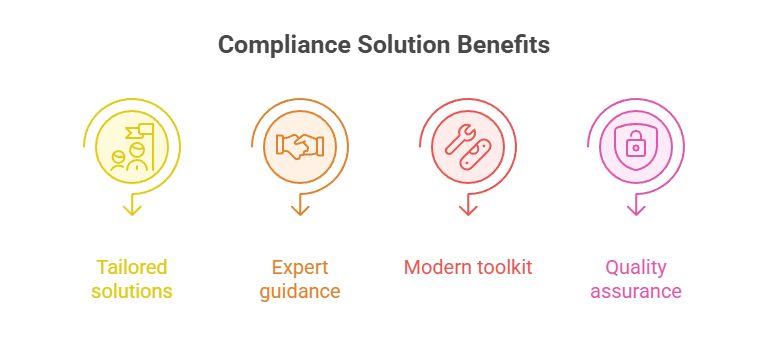
Need help navigating data protection regulations in the UAE? Contact Wattlecorp for end-to-end GDPR compliance solutions.
The strict regulations and sophisticated threat landscape in the UAE make it compulsory for companies operating in this region to strictly comply with GDPR regulations. This is crucial given the harsh penalties when violating stringent laws, like the Personal Data Protection Law (PDPL)
Ensuring compliance with UAE Data Protection Laws, including GDPR means a lot when safeguarding data privacy of your customers and stakeholders. Doing so helps build trust and avoid hefty fines.
Businesses should create a solid adherence framework by understanding the main GDPR obligations.
For all kinds of enterprises, managing vendor compliance, fixing technology protections, and carrying out regular audits to ensure ongoing conformance must be top responsibilities.
In this case, Wattlecorp Cybersecurity Labs happens to be an excellent partner. We have a successful track record in meeting cybersecurity needs and offering GDPR compliance services in the UAE, and we offer comprehensive services tailored to your business’s security needs.
From audits to execution, our experience ensures that your business remains safe, compliant, and ahead of potential dangers.
Let Wattlecorp help you achieve seamless GDPR compliance and enhanced digital security.
Feel free to contact us to address all your compliance-related issues or concerns.
Stay Ahead with GDPR Compliance.
GDPR Compliance Requirements FAQs
1.Even if my company is located outside of the EU, does it still need to abide by GDPR?
Yes, your company will need to, especially if it is handling EU citizens’ personal data while operating outside of the EU.
Also, companies, which provide goods or services to EU individuals or keep tabs on their online activities are subject to GDPR, regardless of where they are located.
Sustaining GDPR compliance builds trust with foreign clients and demonstrates your commitment to data security, thus avoiding severe fines.
2.Under GDPR, what are my customers’ main rights regarding data protection?
Your customers have the following essential data protection rights under GDPR:
• Right to Access: Review the personal data that has been collected and processed.
• Right to Rectification:Correct inaccurate or incomplete data.
• Right to data erasure: Allow requests for data deletion.
• Right to Data Portability: Transfer their data to a different supplier.
• Right to Restrict Processing:Put restrictions on the use of personal data.
• Right to Object:Object to data processing under specific circumstances mentioned in the GDPR.
• Right to Be Informed: The right to know the way data is collected and utilised.
3.What are the biggest challenges businesses face with GDPR compliance?
The significant challenges that companies frequently encounter when adhering to GDPR compliance include:
• Finding Data Sources: Charting and organising the information gathered from various systems.
• Vendor Compliance:Ensuring third-party partners follow GDPR regulations.
• High Costs:Managing budgetary constraints with compliance initiatives.
• Technical Safety protections:Putting strong cybersecurity protections in place.
• Employee Education:Teaching employees best practices for data protection.
• Documentation: Keeping thorough and accurate records of all data processing operations.
• Responding to Data Subject Requests: Managing access and deletion requests in an efficient manner.
